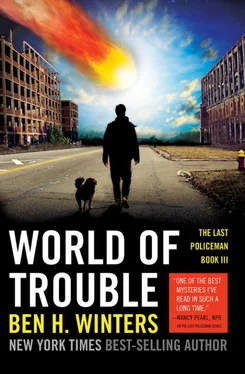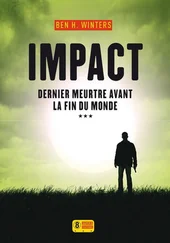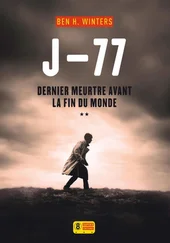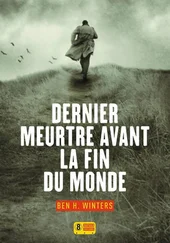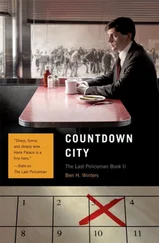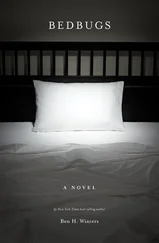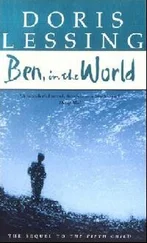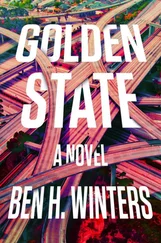The town of Rotary is small, but it’s bigger than Pike, where the SuperTarget was. It’s bigger than anything else around. There’s got to be a hardware store.
There’s a church spire and another one, there’s the fat onion bulb of a water tower with the word ROTARY painted in mile-high letters in the classical small-town style. Autumn dogwoods along the sidewalk, leaves orange and red, branches drooping with rain. No people, no sign of people.
It’s got to be here: towns like this one still have hardware stores, or they did until last year, the mom-and-pop operations, beloved by the locals, losing money every year. There will be a sledgehammer at the hardware store, a row of them, a display, and I will take one and strap it in the wagon and mule it back up Police Station Road.
We go from door to door up Main Street: ice cream store, pizza parlor, pharmacy. A bar with an old-timey saloon theme called the Come On Inn. No one anywhere, no signs of life. “Blue town,” I say to Houdini as we’re poking around an abandoned ice cream shop. He’s nosing into an empty box of sugar cones, trying to get his teeth into something that’s food. There is a utility closet in the basement of the one-story redbrick municipal building, with an acrid reek of ammonia and mop water, a stack of bright orange safety cones, countdown hatch marks scratched in the wall by some bored custodian. No sledgehammer. No tools of any kind.
* * *
We called the towns with color names because of the package of multicolored Post-it Notes that Cortez had; he had them left over from his Office Depot warehouse. When we left a town behind us we would assign it a color, just keeping track, just to keep ourselves amused. All the degrees of dissolution, the differing extents to which each town or city had collapsed under the weight of all this unbearable imminence. Red towns were those seething with active violence: towns on fire, towns beset by marauding bands, daylight shootings, food foragers and food defenders, homes under siege. Only occasionally did we encounter active organized law enforcement: you’d see National Guardsmen patrolling red towns in small clusters, whether officially or unofficially it was hard to say—brave young kids, hollering for order, firing their guns into the air.
Becket, in the Berkshires, was a red town: ten teenagers tailed us on puttering mopeds, chanting for blood like savages. Stottville, New York, was red. De Lancy, Oneonta. Dunkirk, the town where we saved the small family from the fire but left them defenseless on the firehouse steps—bright red.
Green towns were just the opposite, communities where it seemed like some sort of agreement had been made, spoken or implied, to plug along. Folks raking leaves, pushing strollers, waving good morning. Dogs on leashes or bounding after Frisbees. In Media, Ohio, we were astonished to hear the SpongeBob SquarePants theme song being sung lustily by three hundred or more people in a public park at dusk. After the sing-along everyone hung around on the village green: there was a knitting circle, a book club, a demonstration on making candles and another on making bullets. A local sport-shooters association had organized a hunt-and-gather system, traversing the local woods and farmland to bring back venison and beef and distribute it by priority: women and children, the old and the infirm.
A sure sign of a green town was some sort of a garbage system. A trash pyre burning outside the city limits, or even just a dump still in use, people hauling their bags of refuse down there, going out of their way for the mutual benefit. If we didn’t see garbage heaped on curbs, Cortez and I, when we rolled into a certain spot, we knew that town was okay for a night of rest.
Black towns are empty. Blue towns feel empty, but they’re not, they’re just so quiet they might as well be. They’re empty except for occasional scurrying, nervous souls darting from one place to another, some feeling safer in the day, some at night. Peeking out of windows, clutching guns, measuring out what they’ve got left.
By noon we have worked our way through downtown, and Houdini and I reluctantly turn our search to private homes. I set the protocol as knock, wait, knock again, wait again, push in. I find houses cluttered with small personal items: unseasonal clothing, waffle irons, trophies, the sorts of things people leave behind when they leave in an emergency. But tool sheds are empty, like the fridges, like the pantries and the gas cans. At one tidy little aluminum-sided one-story I knock, wait, knock again, wait again, push in, and find a tiny, very old man asleep on an armchair, with a faded Time magazine spread out on his chest, like he fell asleep a couple years ago and is about to wake up to a terrible surprise. I tiptoe backward out of there and creep the door shut.
Blue town. Classic blue town.
* * *
It’s two o’clock now on the Casio. At some point the sun has burned the clouds away. Time passing and passing.
The thought comes from nowhere, unbidden, big as a hovering spaceship, filling the sky: She’s dead, back there. Back there in the woods. Somewhere I didn’t see her .
Or else she’s down in that hole and she’s not coming out because she doesn’t want to, and what I’m doing here is I’m wasting time until the end.
Keep walking, Hen. Keep searching. Do your job. She’s fine.
On Brookside Drive, six short blocks from the American Legion hall, is a small brick ranch house, partially surrounded by some kind of blast wall, a ten-foot-high barrier of concrete. Serious business, like this modest one-story home is an American embassy in Baghdad or Beirut. Thick concrete, smooth face, with slits in the surface, as if for arrows. This fortification was built to withstand not the end, but the events leading up to the end. Thieves. Bandits on the road.
“Hello?” I call up toward the slits. “Hello?”
The sky erupts with the deafening clatter of machine-gun fire. I drop down to my knees. Houdini goes bonkers, chasing himself in a wild circle. Another rip of live fire.
“Okay,” I say, yelling into the muddy lawn, where I threw myself down. “Okay.”
“I still have the right to defend my home,” says a voice, thick and hoarse and slightly manic, from somewhere beyond the wall. “I still have the right to my home.”
“Yes, sir,” I say again. “Yes, sir, I know.”
This is a blue-town man. I can’t see his face, but I can feel his fear, his anger. I look up slowly, very slowly, and get a good look at the gun muzzle, long and stiff like the nose of an anteater, poking through one of the slits.
“I’m going,” I say, “I’m sorry to bother you,” and I go, I crawl away, nice and slow, butt up in the air and hands down.
Worming my way out of there takes me right past the base of the wall, and I see where the man who built it—whoever built it—put a tradesman’s stamp in the stone. It’s a single word, colored in a deep somber red: JOY.
The only suicide victims I find in Rotary are in a screened-in sunporch on Downing Drive: gunshots, husband and wife, a pitcher of lemonade on the glass-topped front-porch table between them, sugar crystals clinging to the sides, lemon wedges rotting at the bottom. The husband still holds the rifle, clutched between his hands, sunk into his lap. I get a quick read on the scene, instinctively, without even wanting to. He was the shooter, he killed her first, cleanly, and then himself; he took one high on the cheek—a first try, a miss—and then a second shot, under the chin and correctly angled.
I feel a quick swell of good feeling toward the dead man, the bottom of his face a red hole, for having honored their bargain. First his wife and then himself and he followed through, as promised. The lemonade pitcher buzzes with bees, attracted to the fading sweetness.
Читать дальше
